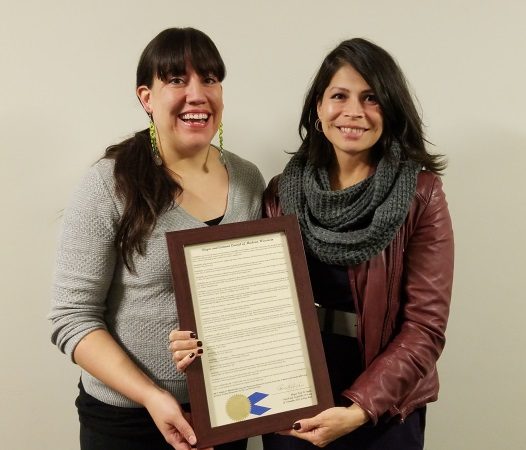At a recent meeting, the Madison Common Council passed a resolution proclaiming the day after Thanksgiving as “Ho-Chunk Day” throughout the city of Madison.
“I can’t tell you how much that means to us,” said tribal member Carly Lincoln. “To have this acknowledged here in our state capital just means so much.”
Sponsoring the resolution were all 21 members of the legislative body, including the mayor. They handed the floor over to District 11 alder Arvina Martin for a reading of the text.
“The Ho-Chunk people are descendants of the effigy mound builders,” Martin said, “and are the aboriginal inhabitants of the Madison region.”
Shortly into the reading, Martin disclosed that she was actually a member of the Ho-Chunk tribe herself.
“I’m saying ‘they,’” Martin said, “but I’m also one of them.”
The alder proceeded to read each of the clauses contained in the resolution, providing a brief history of her people and their long-term occupation of the Madison area.
“Historic documents describe the Ho-Chunk as a large and populous tribe of 10,000 that occupied more than 10 million acres of land in much of Southern Wisconsin and Northern Illinois,” Martin said.
She recounted the various confrontations her tribe had with white settlers, and the drastic decline in population they had suffered throughout the colonial era.
“The Ho-Chunk of the 1650s were not the same power they had been,” Martin said. “Warfare and diseases disseminated the tribe by the late 17th century.”
She talked about how, after the United States acquired nationhood status, things only became worse for her people.
“Beginning in 1849,” Martin said, “the federal government began a series of attempts of forcible removals. The Ho-Chunk were rounded up and put into boxcars (for relocation), leading to mistrust and conflict with a dominant government society.”
In light of such facts, Martin said dedicating a day to the Ho-Chunk people was only appropriate. She said that doing so would be the start of a slow and steady healing process for tribal members, and a way for the city to pay respect to its original inhabitants.
“The City of Madison recognizes the historical trauma and how it still reverberates today,” Martin said, “so that healing can take place and progress can be made.”
Speaking in support of the resolution was a representative from the Ho-Chunk Nation legislature.
“I have been a Madison resident for a long time,” said District 2 representative Carly Lincoln. “And to see the burgeoning friendship and relationship that we have here in Madison, it’s unrivaled. There’s always interest in what we’re doing and who we are as a people.”
She shared the history of the newly recognized holiday, which she said has been celebrated by her people for nearly forty years.
“Ho-Chunk Day was known as Winnebago Day and dates back to the 1970s,” Lincoln said. “It’s observed in our Employee Relations Act, and is an observed holiday within the Ho-Chunk Nation. And this year we are celebrating it in Madison as well.”
The legislator said she was honored that her hometown was finally taking the initiative to address some the past wrongdoing that took place in the region.
“We have a long history here,” Lincoln said. “So I really appreciate it.”
This Thanksgiving marked the second year that Ho-Chunk Day was celebrated in the city of Madison.





























